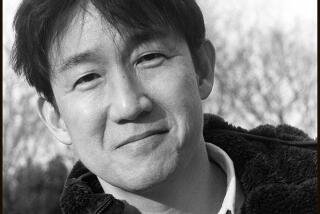DISCOVERIES
The Law of Falling Bodies
A Novel
Duff Brenna
Hopewell: 362 pp., $18.95
MEET Virgil Francis Foggy, age 14, rendered from all sides by a writer who has eyes in the back of his head. At home on the dairy farm in Minnesota, Virgil chops the heads off chickens. (“Mercy, Virgil! Mercy!”) He ponders his future: “Will he really take over the farm like Pappy says? Will he be a farmer like Pappy and Jim? Uncle Dick has told him he is too stupid for school anyway, so he might as well be a farmer. . . . He has a way with cows.”
Letters come from his older brother Vernon, away at war: “I feel like something in me is dying, leaving a hole as big as my chest, the hole filling with hate of everything here and everything at home that got us here.” Vernon kills a man, who whirls “like a little boy pretending to die.” Virgil listens to his mother and stepfather, drunk, fighting. His stepfather beats him up. His mother is pregnant. Duff Brenna, the gyroscope in Virgil’s head, writes the world as Virgil sees it, looking through a window into a storm: “Twigs tattoo the glass.”
--
Learning to Love You More
Harrell Fletcher and Miranda July
Prestel: 158 pp., $19.95 paper
“SOMETIMES it is a relief to be told what to do,” the authors of this wonderful, strange photo book explain. “We are two artists who are trying to come up with new ideas every day. But our most joyful and even profound experiences often come when we are following other people’s instructions. When we are making crepes from a recipe, attempting to do a handstand in yoga class, or singing someone else’s song.” With this in mind, Harrell Fletcher and Miranda July started a website in 2002 called Learning to Love You More. In it they provided assignments: Take a picture of your parents kissing; reread your favorite book from fifth grade; write your life story in less than a day; take a flash photo under your bed; and many others. The responses came thick and fast (more than 5,000 and still coming) from all over the world. The authors’ favorites are here reproduced, and they are wildly beautiful, imaginative, complex, funny, sad and simple.
--
A Working Man’s Apocrypha
Short Stories
William Luvaas
University of Oklahoma Press: 208 pp., $24.95
IN these brilliant stories, many set in that oddly named region of Southern California, the Inland Empire (“Mount San Gorgonio to the north, the San Jacintos due east, fractured, faceted with severe late afternoon light”), laws of nature are often broken. Floods, tornadoes and other disasters inspire varied means of survival; death sparks new relationships. A brother and sister, twins, remember how they drifted apart. An artist recalls the practical wisdom of a man who worked for her: “Nayls go in coffee cans” and “Don’t trust brite moonlyt nun thatl mess you up evrah tyme you don’t wach yoresef it cud make a dam dum crippuled up dibettuck want to go dansing.”
--
A Concise Chinese-English Dictionary for Lovers
A Novel
Xiaolu Guo
Nan A. Talese/Doubleday: 304 pp., $23.95
“EVEN Shakespeare write bad English,” thinks 23-year-old Zhuang, who has come from China to London to learn English. “Person as dominate subject, is main thing in an English sentence. Does it mean West culture respecting individuals more? . . . Maybe Chinese too shaming putting their name first, because that not modest way to be.” When she falls in love, language is little help. Words like “equal,” “romance,” “possess” and “freedom” mean different things in Chinese and English: “I say I love you, but you say you want to have freedom. Why is freedom more important than love? Without love, freedom is naked. . . . Why is love the prison for freedom?” Zhuang’s voice is funny, childlike and wise all at once. Her English improves as the novel and the relationship progress, but it is still, in the end, only language.
--
More to Read
Sign up for our Book Club newsletter
Get the latest news, events and more from the Los Angeles Times Book Club, and help us get L.A. reading and talking.
You may occasionally receive promotional content from the Los Angeles Times.






